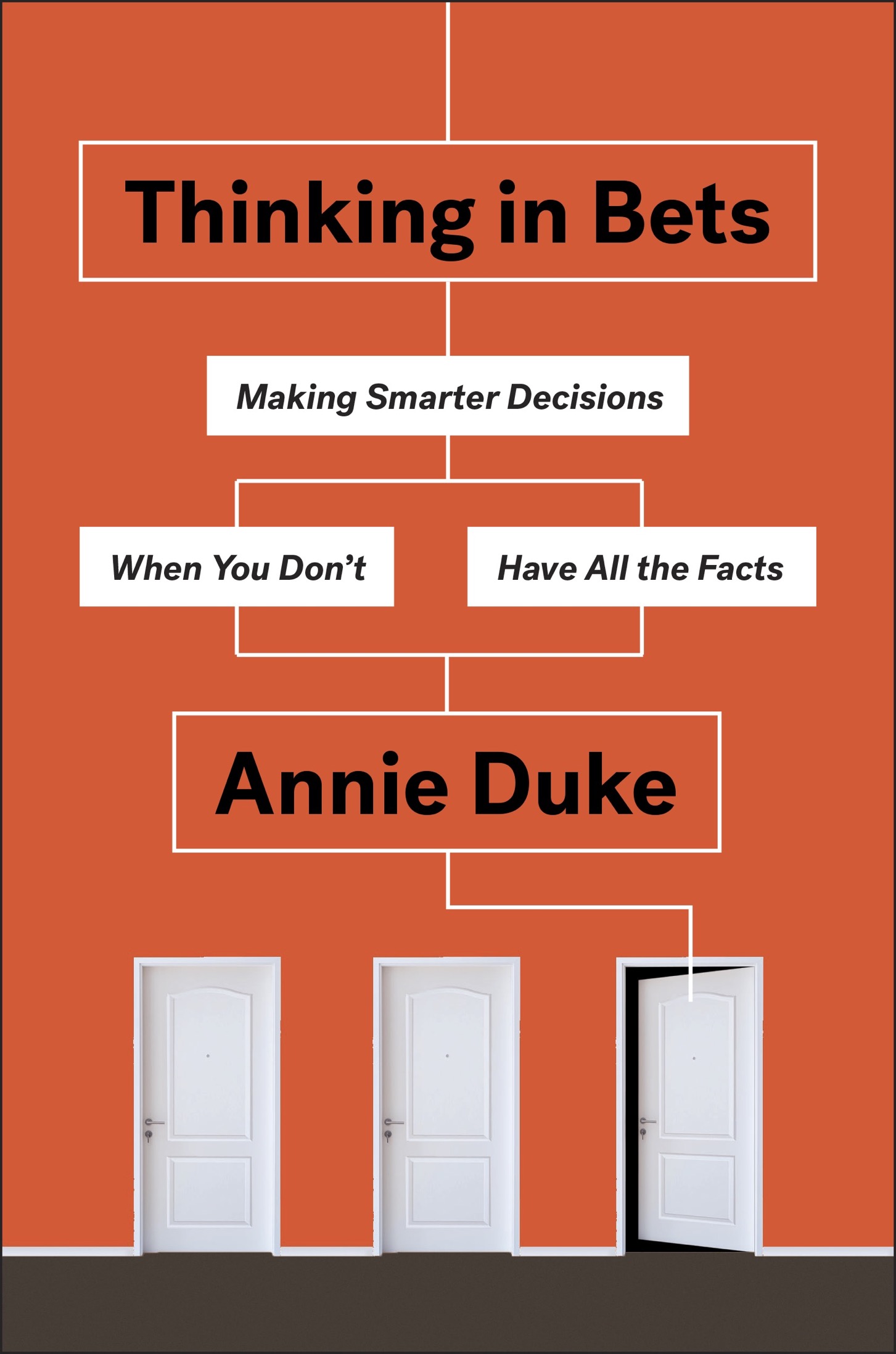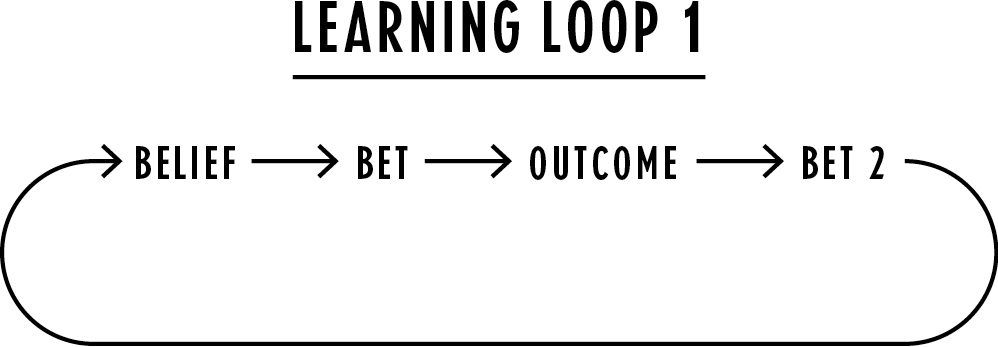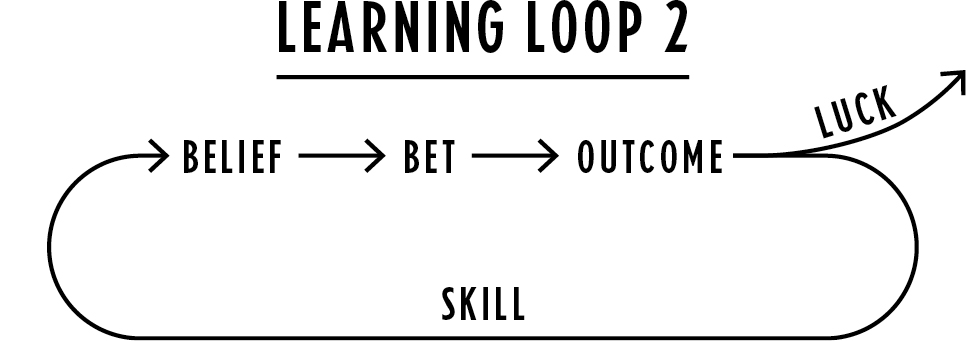Thinking in Bets - Annie Duke

## Metadata
- Author: **Annie Duke**
- Full Title: Thinking in Bets
- Category: #books
## Highlights
- “Experience is not what happens to a man; it is what a man does with what happens to him.” ([View Highlight](https://read.readwise.io/read/01jngnfg1ptcj8geswbbvetha4))
-  ([View Highlight](https://read.readwise.io/read/01jngnkyewwgdeckbyrm0besnb))
-  ([View Highlight](https://read.readwise.io/read/01jngnn791se246bz82wzhxdgt))
-  ([View Highlight](https://read.readwise.io/read/01jngp7w551y47hgstk2h9yvnn))
## New highlights added March 4, 2025 at 5:08 PM
- When I started playing poker, I chose truthseeking. Like Neo, I did it reluctantly and wasn’t sure what I was getting into. My brother took a blunt approach with me. My instinct was to complain about my bad luck and to marvel at how poorly others played, decrying the injustice of any hand I might have lost. He wanted to talk about where I had questions about my strategic decisions, where I felt I might have made mistakes, and where I was confused on what to do in a hand. I recognized he was passing along the approach he learned with his friends, a group of smart, analytical East Coast players, many of whom, like Erik Seidel,[*](private://read/01jnabn3eqn4savr1qbrdcn17n/#footnote_1) were on their way to establishing themselves as legends at the game. ([View Highlight](https://read.readwise.io/read/01jnhwcvt8rgyn267zw2tmvq5e))
## New highlights added March 4, 2025 at 9:21 PM
- Early in my poker career, my poker group recommended that a way to avoid the effects of self-serving bias when I was losing was to have a preset “loss limit”—if I lost $600 at the stakes I was playing, I would leave the game. The smart, experienced players advising me knew that in the moment of losing, I might not be my most rational self in assessing whether I was losing because I was getting unlucky or losing because I was playing poorly. A predetermined loss limit acts as a check against irrationally chasing losses, but self-enforcement is a problem. If you have more money in your pocket, you might still take it out. If you’re out of money, casinos have ATMs and machines that let you get cash advances on your credit cards. Poker players are also pretty liberal about lending money to losing players. ([View Highlight](https://read.readwise.io/read/01jnj9zw1as30sey1ywcz6yrn9))
- I was much less likely to break a loss limit because I knew I was accountable to my pod. If I reached my loss limit and my inner voice said, “This game is so good that I should put up more money and keep playing,” it also reminded me I’d have to answer for the decision to a group of players I respected. Accountability made me run that conversation in my head, in which I started explaining how I was just getting unlucky and they would expose why I was likely biased in my assessment, helping me resist the urge to buy more chips. ([View Highlight](https://read.readwise.io/read/01jnja1713n0e65916dh3hcdgd))
- When we think in bets, we run through a series of questions to examine the accuracy of our beliefs. For example:
• Why might my belief not be true?
• What other evidence might be out there bearing on my belief?
• Are there similar areas I can look toward to gauge whether similar beliefs to mine are true?
• What sources of information could I have missed or minimized on the way to reaching my belief?
• What are the reasons someone else could have a different belief, what’s their support, and why might they be right instead of me?
• What other perspectives are there as to why things turned out the way they did? ([View Highlight](https://read.readwise.io/read/01jnjab199bjjx3022nge5w7qq))
- After September 11, the CIA created “red teams” that, according to Georgetown law professor Neal Katyal in a *New York Times* op-ed, “are dedicated to arguing against the intelligence community’s conventional wisdom and spotting flaws in logic and analysis.” Senior Obama administration officials, following the raid that killed Osama bin Laden, mentioned red-team analysis among the methods used to measure the degree of confidence that bin Laden, in the absence of visual or auditory confirmation, was in the compound subject to the raid. ([View Highlight](https://read.readwise.io/read/01jnjakx8z610q93rrm1bx9d9q))
## New highlights added June 13, 2025 at 8:44 AM
- In *The Ascent of Man*, scientist Jacob Bronowski recounted how von Neumann described game theory during a London taxi ride. Bronowski was a chess enthusiast and asked him to clarify. “You mean, the theory of games like chess?”
Bronowski quoted von Neumann’s response: “‘No, no,’ he said. ‘Chess is not a game. Chess is a well-defined form of computation. You may not be able to work out the answers, but in theory there must be a solution, a right procedure in any position. Now, real games,’ he said, ‘are not like that at all. Real life is not like that. Real life consists of bluffing, of little tactics of deception, of asking yourself what is the other man going to think I mean to do. And that is what games are about in my theory.’” ([View Highlight](https://read.readwise.io/read/01jxkrtd04pp47cv33fdavm4a9))
- The way our lives turn out is the result of two things: the influence of skill and the influence of luck. For the purposes of this discussion, any outcome that is the result of our decision-making is in the skill category. ([View Highlight](https://read.readwise.io/read/01jxmszw3v5mrn6hrvtnn28bsz))
## New highlights added June 14, 2025 at 7:35 AM
- We all want to feel good about ourselves in the moment, even if it’s at the expense of our long-term goals. Just as with motivated reasoning and self-serving bias, blaming others for their bad results and failing to give them credit for their good ones is under the influence of ego. Taking credit for a win lifts our personal narrative. So too does knocking down a peer by finding them at fault for a loss. That’s schadenfreude: deriving pleasure from someone else’s misfortune. Schadenfreude is basically the opposite of compassion. ([View Highlight](https://read.readwise.io/read/01jxpdhq9e716nsjfztw825jse))
- Ideally, our happiness would depend on how things turn out for us regardless of how things turn out for anyone else. Yet, on a fundamental level, fielding someone’s bad outcome as their fault feels good to us. On a fundamental level, fielding someone’s good outcome as luck helps our narrative along.
This outcome fielding follows a logical pattern in zero-sum games like poker. When I am competing head-to-head in a poker hand, I *must* follow this fielding pattern to square my self-serving interpretation of my own outcomes with the outcomes of my opponent. If I win a hand in poker, my opponent loses. If I lose a hand in poker, my opponent wins. Wins and losses are symmetrical. If I field my win as having to do with my skillful play, then my opponent in the hand must have lost because of their less skillful play. Likewise, if I field my loss as having to do with luck, then my opponent must have won due to luck as well. Any other interpretation would create cognitive dissonance. ([View Highlight](https://read.readwise.io/read/01jxpdkb3q97gtvsxq9mdqmrqg))
- As Richard Dawkins points out, natural selection proceeds by competition among the phenotypes of genes so we literally evolved to compete, a drive that allowed our species to survive. Engaging the world through the lens of competition is deeply embedded in our animal brains. It’s not enough to boost our self-image solely by our own successes. If someone we view as a peer is winning, we feel like we’re losing by comparison. We benchmark ourselves to them. If their kids are doing better in school than ours, what are we doing wrong with our kids? If their company is in the news because it is about to go public, what’s wrong with us that we’re just inching forward in our work? ([View Highlight](https://read.readwise.io/read/01jxpdp35nw0th1zj428vram5v))
- What accounts for most of the variance in happiness is how we’re doing *comparatively.* ([View Highlight](https://read.readwise.io/read/01jxpdqxtsm8tx6bbv3w0eqjhk))
- I encourage you to read Lyubomirsky’s work on the subject, Daniel Gilbert’s *Stumbling on Happiness*, and Jonathan Haidt’s *The Happiness Hypothesis*, cited in the Selected Bibliography and Recommendations for Further Reading.) ([View Highlight](https://read.readwise.io/read/01jxpdrm7swzdp5gfc2934f5gt))